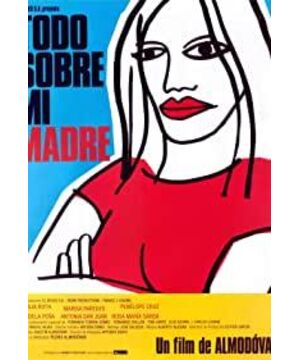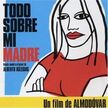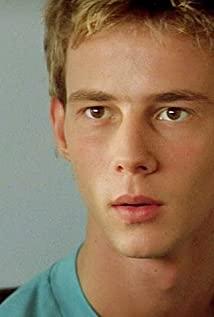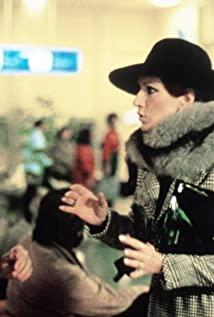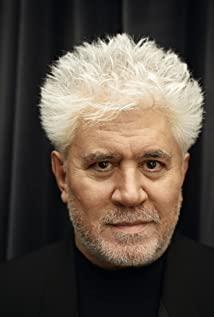/ Organized by Fan Daming /
Time: 10:55-11:15 am, November 3, 2012 (Saturday)
Location: Henglu Art, No. 202, Nanshan Road, Hangzhou The lecture hall of the museum
(the scene after the viewing of Almodovar's "All About My Mother" at Henglu Art Film Bar)
Participants: (Preface) Fan Daming, Wang Xiling, Cai Ling, Peng Cairong, Ma Yile, Wu Wei, Niu Yuzhu (Viewers: Chen Xingsheng, Li Xiaobo, Li Xiaoming, Li Jian, Ji Boqing, Zhu Xilin, Xu Bolin, Zhang Yun, etc.)
Moderator: Fan Daming
Records: Wu Wei
’s film is roughly divided into three segments; the subtitles at the end of the film reflect the theme established by the director: Praise for women , praised the female
Fan Daming: "All About My Mother" is also a film about women - mother Manuela, mother girlfriend Ayue, female star Yanmi and nun Rosa, mainly these four people. But the point of view is from the son, and the title of the film should be the name of the notebook left by the son. Mother and son depend on each other. The mother works as a nurse in the organ transplant department of a hospital in Madrid. The son has been writing since he was 8 years old, and he wants to be a writer. On the son's 18th birthday, the mother's gift to her son was to accompany her son to watch the performance of Yanmi, a female star he admires, and hoped that the son would wait for Yanmi to come out and ask for her autograph, but he was killed in a car accident in the rain. Mourning Nine Springs. It's a birthday here, but it's a day of mourning. While the son had been asking to find his biological father before his death, the mother decided to embark on the road of finding her husband in grief. The film is roughly divided into three parts: the mother loses her son and goes out to find her husband or finds her father on behalf of her son; the mother becomes Yanmi's assistant and saves the performance after meeting her girlfriend A Yue; the mother takes care of the nun Rosa who is pregnant with her husband and child, After Rosa died in childbirth, she was eventually able to raise her husband's children. The final credits read: "Dedicate this film to Beatty Davis, Jenna Rowland, Lome Snyder, to all actresses who play heroines, to all women who play, to all transsexuals Actors, all who want to be mothers, to my mother", this is the point, reflecting the theme established by the director for the film: praise women, praise women, no matter what social attributes you are.
About the situation of mother and Ayue
Wang Xiling: Is this A Yue actually a man?
Van Damien: Yes, it's the same as her own husband Lola she's looking for. It's all about changing male to female. Her mother and Ayue are old friends. On her way to Barcelona, she happened to encounter a client of the prostitute Ayue who was assaulting her. Her mother rescued her. The mother was originally with A Yue and was also a prostitute.
Cai Ling: She worked in the organ transplant department of that hospital after Cong Liang.
Fan Daming: Because he is a nurse doing organ transplants, his son should also sign for the organ transplant when he died, but the film also shows how his son's heart was given to a middle-aged patient. For this reason, the mother has been tracking to A Coruña, the most northwestern tip of Spain, to secretly observe the condition of the middle-aged man with the implanted son's young heart being discharged from the hospital three weeks later. These all show the great extent to which a mother who cherishes her son has raised her son for 18 years, and once she loses her son, she will suffer a huge blow.
The realities of Western countries such as homosexuality, transgender, AIDS, and organ transplantation were all exposed in time
. Cruise was a lover. Both Ayue and Lola in the film are transgender.
Van Damien: In Spain, some prostitutes are transgender. There are also transgender people in our country, and the dancer Jin Xing is a transgender person. In addition, Mei Lanfang on the stage of Peking Opera in my country is a man playing a woman, and Li Yugang recently is a man playing a woman.
Cai Ling: That's a reverse performance.
Fan Daming: The shemale in the show in "Love in High Heels" is actually a cross-acting performance, and his job is a male judge.
Ma Yile: This film reflects and exposes the realities of Western countries, such as homosexuality, transgenderness, AIDS, and organ transplantation.
Cai Ling: Did Sister Rosa have sex with Lola before she became a nun?
Fan Daming: The nun works as a volunteer, as a social worker. She is dedicated to helping those who are sick, including prostitutes with AIDS. She should have met Lola while volunteering.
Love is greater than hate: what the film shows is a kind of friendly behavior, with a strong inclusiveness
Ma Yile: The plot of this movie is quite complicated, but in general, their country seems to be dealing with all kinds of accidents, and it doesn't use hatred and revenge like in Chinese movies. What the film shows is an act of kindness.
Wang Xiling: It has a strong inclusiveness.
Ma Yile: If it happened in a Chinese movie, the son died in order to get the star's autograph, but he didn't get it. The mother would definitely hate the fan, but she didn't. Later, she went to the ex-husband. They were unhappy at first. After breaking up and walking away, even when her ex-husband and Rosa had children, she was not jealous of her, but cared about Rosa with a sister or motherly love. I think these show that love is greater than hate, and in our domestic films, there is often less love and more hate.
Wang Xiling: This may be due to different national conditions. The emotional expression in our films is often blunt.
Ma Yile: As for the father, who is a drug addict and suffers from AIDS, and doesn't care about the child. He didn't even know there was this child until the son died, but the son didn't hate the father, he just wanted to know who the father was. The film showed a kind of concern.
Wang Xiling: They also condemn what is wrong, but this condemnation is expressed through the tolerance of others towards them. Although people with AIDS end up dying, the conflicts they constitute are resolved by human nature.
Ma Yile: They really fill the world with love, they don't create too much hatred between people, it's through love. If you look at the world with the eyes of love, some hatred will be resolved; if you look at the other party with the eyes of hatred, you will become more and more hated. The world needs giving, and only giving love will get love.
We can also understand, recognize and accept their tolerant emotions, and we all feel the same
. Wu Wei: The people of our country also suffer from various pains in their lives. It should be said that there is also love and such tolerance, but our film and television works However, it does not reflect this tolerance as they do. In fact, we can understand, recognize and accept their various practices in the film and their inclusive emotions, and feel the same way.
Ma Yile: The education of Mao Zedong Thought in New China was based on class struggle, especially the "Cultural Revolution".
Wang Xiling: I remember, my grandmother once said to me that it is not okay to be too clear about love and hate. She didn't tell me too much truth, just said that it's not right or wrong.
The feelings that father Lola revealed to his son are the feelings that all human beings share and recognize
Wu Wei: Human nature is complex, not black and white, love or hate. The transgender father Lola, we don't know what his early thought process was, but in the end, the feelings he showed when he hugged the younger son and looked at the photos of the eldest son were the feelings shared and recognized by all human beings.
Wang Xiling: This movie, why do I think it was made so well? The reason is that a good movie must reflect the humanistic spirit of the human being, and everyone can understand such things, and everyone has such things in their hearts, just like the world is united.
Love is not one-sided, it's not about me loving you, you love me, it's a relational, reciprocal issue
Niu Yuzhu: Almodovar is biased towards a female perspective. Now everyone will also learn about Spain from film and television news. As Mr. Wang just said, Spain has its social nature and its national conditions. First, this film by Almodovar is viewed from the perspective of women, including the previous one, so there is no lack of tolerance, as well as the intervention of the Virgin and divinity, including the oil painting of the Madonna by the nun’s mother at home, Therefore, the nun mother hated the person who harmed her daughter in her heart, but she still had a tolerant side. This is the influence of religion. Then think about whether the Spanish are actually like this? not necessarily. We have been in contact with a Spanish company before. The Spanish are very aggressive and aggressive. In the film, because of Almodóvar's female perspective, the film's aggression is not so strong, so can we think so? , that is to say, Spanish women are more inclined to love. Why are there so many questions in the film and where do these questions come from? It's all about men. A woman, including her mother's nature, including her nature to love her lover, is a very kind starting point, and the culprit is that man. So I think women in Spain, in the words of Teacher Ma, are more tolerant and loving. There are very few men involved in the film, only a few strokes. What can be seen is that he is a person who has harmed this and that. So, including the problem of class struggle mentioned by Teacher Ma, is there a lack of love in our lives? When entering the church, everyone promotes the issue of love, including all of us watching this movie here and talking about love; but when we go out, everyone will be very nervous, because love is not a one-sided issue, it is not a one-sided issue. I love you and you love me. Case. This is a related, reciprocal question.
The perfection of social security makes people inclined to this point: consider love more than material
Niuyuzhu: and the protagonist in the film is pregnant, giving birth to a child, and more inclined to spiritual considerations, behind it is a Spanish society. Welfare security system. I dare not say that Spain's social security system is the best in the world, but at least her single mother can rent a house to live in. If it is placed in China, she has to consider how much it will cost me to have a child and raise a child; how much will it cost me to get AIDS treatment, including if you harm me, it will also be involved. The perfection of social security in Spain makes people inclined to this point: consider love more than material things, love can have more elements, and tolerance elements can be more.
As a feminist, the director reflects the great and tolerant virtues of women in the film.
Cai Ling: If this film is shown to the Spanish, I wonder if they think the things in it are unrealistic? I'm Chinese and I don't know. Whether the social security mentioned by Mavericks is true or not, I wonder if they can really rent such a good house. As a feminist director, Almodovar reflected the great and tolerant virtues of women in this film. Westerners promote love a little more. I think this is actually related to the situation of education. Education has a great impact on people. Of course our kids are better now. Now that the west wind is spreading through the Internet, everyone is gradually changing this point of view, and they are all talking about love. In fact, when we say love, we want to be loved. Tolerance is not only good to others, but also good to yourself, just like looking in a mirror, you smile at it, and it smiles at you.
The film makes men unworthy of a good fate
Fan Daming: Because of the director's feminism, the film makes men unworthy of a good fate: his son died in a car accident; Lola, who did not care about his wife and children, died of AIDS even though he later became a "prostitute" ——In fact, his transgender change is just a "cross-dress" (otherwise, how could the nun be pregnant?); and the nun's father has become Alzheimer's. There is only one man, A Yue, who is a transgender woman, but it is also because he met the heroine's roadside rescue, and he is no longer a so-called "prostitute".
Organized on November 13, 2012
View more about All About My Mother reviews


